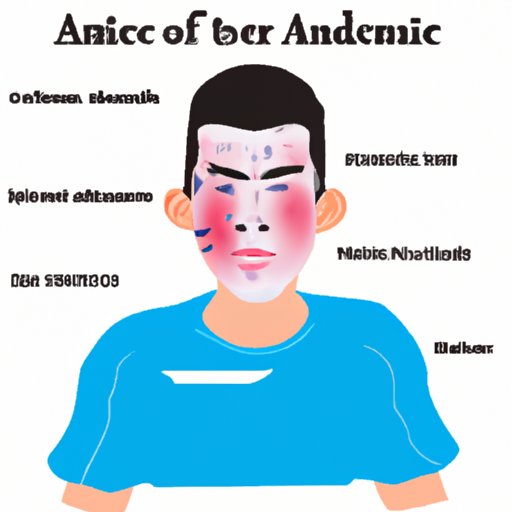Introduction
Acne is a common skin condition that affects many people around the world. It is characterized by the appearance of pimples, blackheads, and whiteheads on the face, neck, chest, back, and shoulders. Acne can be mild or severe, and can range from a few spots to extensive breakouts.
Sweat is a natural bodily function that helps regulate body temperature. Sweat consists of water, salt, and other minerals, and is produced by the sweat glands located in the skin. Sweat can be triggered by exercise, hot weather, stress, and other factors.
In recent years, there has been much debate about the possible link between sweat and acne. While there is no definitive answer, this article will explore the relationship between sweat and acne and provide suggestions for reducing sweat and improving acne.

Investigating the Link Between Sweat and Acne
When it comes to acne, there are many potential causes, including hormones, genetics, diet, and lifestyle. Some experts believe that sweat may also play a role in the development of acne.
Examining the Role of Sweat in Acne Development: Sweat itself does not cause acne, but it can contribute to the development of acne in some cases. Sweat contains oils and proteins that can clog pores and lead to the formation of pimples, blackheads, and whiteheads. In addition, sweat can irritate the skin, leading to redness and inflammation.
Is Sweat a Cause of Acne?: While sweat itself does not directly cause acne, it can aggravate existing acne and increase the severity of breakouts. For example, sweat can mix with sebum, an oily substance produced by the sebaceous glands, and clog pores. This can lead to the accumulation of bacteria, which can further irritate the skin and lead to more breakouts.

The Impact of Sweat on Acne Breakouts
How Sweat Can Affect Acne Flare-Ups: When sweat mixes with oil and bacteria on the skin, it can trigger an inflammatory response, leading to redness and swelling. If sweat accumulates in the pores, it can form a breeding ground for bacteria, causing even more inflammation. In addition, sweat can irritate the skin, making it more prone to breakouts.
What Role Does Sweat Play in Acne?: Sweat itself does not cause acne, but it can worsen existing acne. Sweat can mix with oil and bacteria on the skin, clog pores, and irritate the skin, leading to more breakouts. Therefore, it is important to take steps to reduce sweat and minimize its impact on acne.
Exploring the Relationship Between Sweat and Acne
Factors That May Increase Sweat Production: There are a number of factors that may increase sweat production, such as exercise, hot weather, stress, certain medications, and certain foods. In addition, certain medical conditions, such as hyperhidrosis (excessive sweating), can cause excessive sweating.
Potential Solutions to Reduce Sweat and Improve Acne: To reduce sweat and improve acne, it is important to take steps to keep the skin clean and dry. This includes washing the skin regularly with a gentle cleanser and avoiding harsh soaps. In addition, wearing loose, breathable clothing can help reduce sweat and irritation. For those with excessive sweating, antiperspirants and prescription medications can help reduce sweating.
Conclusion
Sweat itself does not cause acne, but it can aggravate existing acne and increase the severity of breakouts. Sweat can mix with oil and bacteria on the skin, clog pores, and irritate the skin, leading to more breakouts. Therefore, it is important to take steps to reduce sweat and minimize its impact on acne.
To reduce sweat and improve acne, it is important to keep the skin clean and dry. Wearing loose, breathable clothing can help reduce sweat and irritation. For those with excessive sweating, antiperspirants and prescription medications can help reduce sweating.
In conclusion, while sweat does not directly cause acne, it can contribute to the development of acne and worsen existing acne. Taking steps to reduce sweat and keep the skin clean and dry can help improve acne and reduce breakouts.


